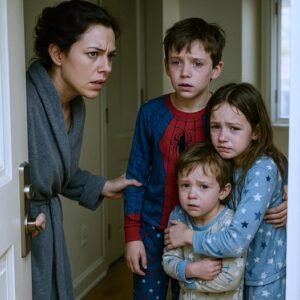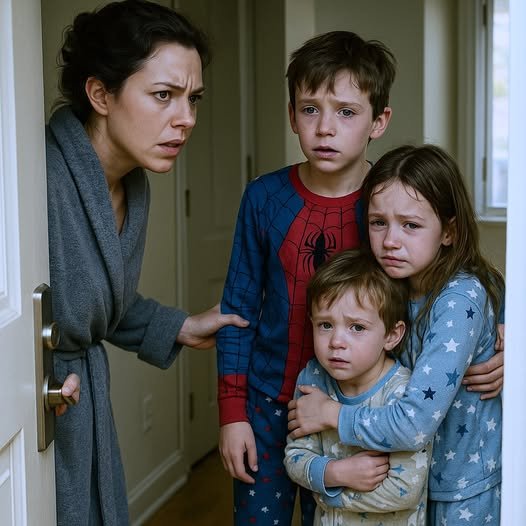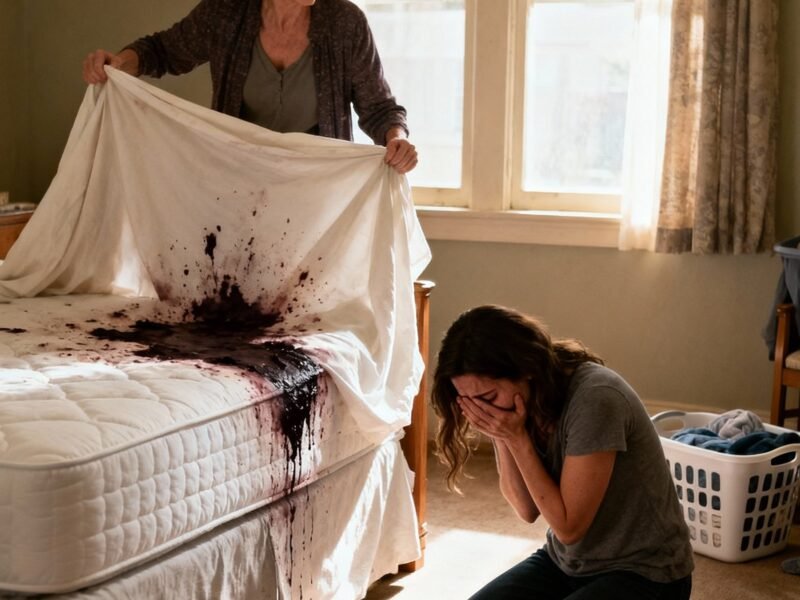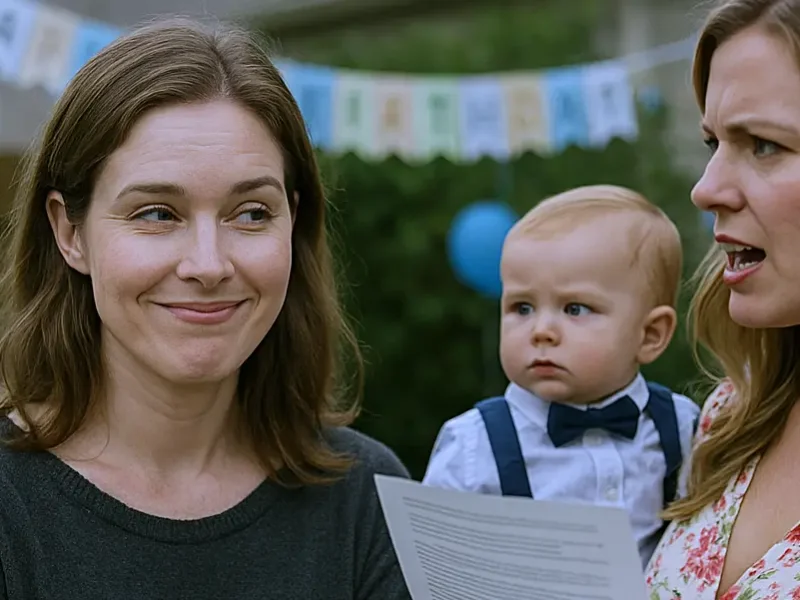My brother’s kids knocked on my door at 2 a.m. Their parents locked them out again, so I taught him a lesson. He will never forget. «Ariel, please, we’re so cold.»
The voice was barely a whisper through my apartment door, but it shot through me like ice water. I grabbed my phone off the nightstand. 3:17 a.m. glowed back at me in the darkness. My heart was already racing as I stumbled to the door, nearly tripping over the corner of my coffee table.

Through the peephole, I saw them: three small figures huddled together in the dim hallway light. I threw the door open so fast it banged against the wall. «Nathan, what on earth?»
My nephew stood there shaking, his pajama shirt plastered to his skinny chest with sweat despite the February cold. Behind him, his little sister Sophia clutched baby brother Owen’s hands so tightly her knuckles had gone white. No coats, no shoes—just their cartoon character socks, now gray and shredded from walking.
«Where are your parents?» The words came out sharper than I meant them to. «It’s the middle of the night.»
«They locked us out.» Nathan’s voice cracked. He was trying so hard to be brave, to hold it together, but I could see him crumbling. «We didn’t know where else to go, Aunt Ariel. We walked. It took… it took a really long time.»
My stomach dropped. «You walked? Nathan, it’s 18 degrees outside! How far?»
«From our house.» Sophia’s teeth were chattering so hard she could barely speak. «We walked from our house.»
Four miles. They’d walked four miles in the dead of winter in their pajamas. I yanked them inside, my hands shaking as I cranked the thermostat up to 75. Nathan’s lips had a bluish tint. Owen wasn’t even crying anymore, just staring at nothing with this blank, terrified expression that no six-year-old should ever have.
«Blankets,» I muttered, racing to my bedroom closet. «I need blankets and… God, your feet.»
When I knelt down to examine them, I had to swallow back the rage threatening to choke me. Their socks were frozen to their skin in places. Sophia’s left foot was an angry red that was going to blister. Owen’s toes were waxy white.
«Tell me exactly what happened,» I said, forcing my voice to stay calm and steady as I wrapped the heated throw blanket around Owen’s tiny body. «Start from the beginning.»
Nathan sank onto my couch, and the story spilled out in fragments. His words painted a picture I’d been trying not to see for years, a picture of my brother Dennis and his wife Vanessa treating parenthood like an inconvenient hobby they’d rather quit.
But this time was different. This time, they hadn’t just been negligent; they’d been dangerous. And as I listened to Nathan describe how they’d knocked on their own front door for 20 minutes before giving up, how they’d had to decide which way to walk in the dark, how Sophia had carried Owen on her back for the last mile when his feet hurt too badly to keep going, I realized something that made my blood run cold.
This wasn’t the first time. It was just the first time they’d come to me.
I made hot cocoa while the kids thawed out under every blanket I owned. My hands wouldn’t stop shaking as I stirred the milk on the stove. I was 33 years old, worked as a guidance counselor at Riverside Middle School, and I’d spent the last decade helping troubled families navigate crisis. But this was different.
This was my family, my brother’s kids. This was everything I’d been trained to recognize and report happening right under my nose.Family games
«Has this happened before?» I asked Nathan quietly as I handed him a mug. Sophia had finally stopped crying, and Owen had fallen into an exhausted sleep in the armchair, still wrapped in blankets like a small, traumatized burrito.
Nathan stared into his cocoa. «Define ‘this’.»
«Being locked out?»
«Not exactly locked out,» he said carefully—too carefully for a 12-year-old. «But… sometimes they forget we’re there. Like, they’ll go somewhere and forget to tell us, or they’ll lock the door when they go to bed and we’re still outside playing, or…» He trailed off.
«Or what?»
«Or they just don’t come home when they say they will.» His voice got very small. «And we have to figure stuff out ourselves.»
Sophia pulled her knees up to her chest. «Nathan makes us dinner most nights. Mom says cooking is boring, and Dad works late. Nathan knows how to make mac and cheese and grilled cheese and breakfast for dinner.»Father’s Day gifts
«Sometimes it’s just cereal,» Nathan added quickly, like he was ashamed, like this was somehow his failure instead of his parents’. «But I make sure Owen gets something. Always.»
I felt something crack open in my chest. «How often are you alone?»
They looked at each other, having one of those silent kid conversations where an entire negotiation happens in eye contact. «Most nights,» Nathan finally admitted. «Dad works until 8 or 9. Mom goes out with her friends.»
«She’s got book club on Tuesdays, wine night on Thursdays, girls’ weekends once a month. When Dad gets home, sometimes he’s tired and just goes to his room. Sometimes they go out together, and…»Father’s Day gifts
«And you’re responsible for Sophia and Owen?»
«I don’t mind.» But his eyes said different. His eyes said he was exhausted. «Somebody has to.»
I tried calling Dennis five times. Straight to voicemail. Tried Vanessa. Same thing. Tried their house phone. The number just rang and rang into the void.
It was 4:30 in the morning, and my brother and sister-in-law were unreachable while their children sat in my apartment with potential frostbite. I was a mandated reporter. I knew what the law required. I knew what my training required. But I also knew what it would mean for the kids, for Dennis, for our entire family.
My brother and I had been close once. Before Vanessa, before the kids, before he turned into someone I barely recognized—someone who prioritized his social calendar over his children’s safety.
«Nathan,» I said gently, «has anyone ever told you that you could call for help? Like call 9-1-1 or talk to a teacher?»
His face went pale. «Dad said if we ever told anyone about… about how things are… they’d take us away. He said foster care splits up families and we’d never see each other again.»
And that’s when I knew I had no choice at all.
The Child Protective Services hotline number felt like it weighed a thousand pounds in my phone. I stood in my tiny kitchen, door closed so the kids wouldn’t hear, and stared at the screen. My finger hovered over the call button. Once I pressed it, there was no going back.
Once I pressed it, I would be the person who destroyed my brother’s family, the person who tore apart what was left of the relationships I’d built over 33 years. But when I closed my eyes, I saw Owen’s blank stare, Sophia’s chattering teeth, Nathan’s exhausted resignation to a role no child should have to fill.
I pressed call.
«Child Protective Services. This is the emergency intake line. What is your emergency?»
My voice came out steadier than I expected. «I need to report three minors in immediate danger, ages 6, 9, and 12. They walked 4 miles in freezing temperatures after being locked out of their home. Their parents are unreachable and have been gone for over 7 hours. The children show signs of chronic neglect.»
The intake worker, a woman named Rita Carson, asked questions in a calm, methodical voice that suggested she’d had this conversation a thousand times before. How long had I known about the neglect? What specific incidents had I witnessed? Were the children in immediate physical danger?
Yes. Yes, they were. Owen’s toes might need medical attention. Sophia’s foot was already blistering. Nathan was holding himself together through pure will, but I could see the cracks forming.
«I’m a mandated reporter,» I added. «I work as a school counselor. I should have called before tonight. I kept thinking…» My voice broke. «I kept thinking it would get better, that my brother would figure it out, that I was overreacting.»
«Ma’am, you’re calling now. That’s what matters. Can you keep the children there until an investigator arrives?»
«Yes. Absolutely, yes.»
«Don’t contact the parents. Don’t let the children leave. Someone will be there within 90 minutes.»
After I hung up, I stood in my kitchen for a long moment, hands braced on the counter, trying to breathe. The apartment was quiet except for the hum of the refrigerator and the soft sound of Owen snoring in the living room.
I just reported my own brother to CPS. I just set in motion something that couldn’t be stopped, couldn’t be taken back. By tomorrow, Dennis and Vanessa would know what I’d done. By tomorrow, half my family would probably hate me.
When I opened the kitchen door, Nathan was standing right there. He must have heard everything.
«Are they going to take us away?» he asked.
I knelt down so we were eye-level. «I don’t know, sweetheart. But I promise you, whatever happens, I will fight to keep you three together. And I will make sure you’re safe.»
«Dad’s going to be so angry at you.»
«Yeah.» I pulled him into a hug, felt how thin he was, how much tension he carried in his small shoulders. «Yeah, he probably will be.»
«Thank you,» Nathan whispered into my shoulder. «Thank you for not sending us back.»
And that’s when I started crying.
The CPS investigator arrived at 5:47 a.m. Her name was Patricia Walsh, a woman in her 50s with gray-streaked hair and eyes that had seen too much. She had the look of someone who’d been woken up for emergencies so many times, she kept a go-bag by her bed.
She spoke to the kids with the kind of gentle authority that comes from years of practice. Asked them to show her their feet. Photographed the frostbite damage with a professional camera that made everything feel suddenly, horribly real. Asked if they were hungry, thirsty, needed anything.
Owen wanted his stuffed elephant, the one back at the house he couldn’t get to because his parents had locked him out. Patricia pulled me aside while the kids ate the frozen waffles I’d thrown in the toaster.
«Walk me through what you know. Not just tonight, everything.»
So I told her. About the decreasing grocery supply every time I visited. About the way Nathan had developed this hyper-responsible streak that wasn’t normal for a kid his age. About the «independence» Dennis and Vanessa claimed they were teaching, which was really just neglect with a fancy label.
About the time I’d stopped by unannounced and found ten-year-old Nathan trying to figure out how to use the washing machine because everyone was out of clean clothes. About the parent-teacher conferences Dennis and Vanessa never attended. About how Sophia’s third-grade teacher, Mrs. Gallagher, had quietly started packing extra snacks in her backpack because she came to school hungry so often.
«You’re a mandated reporter,» Patricia said, not accusing, just stating fact.
«I know. I thought about calling a hundred times, but he’s my brother. And I kept thinking…»
«That family handles family problems privately? Something like that?» Patricia nodded slowly, making notes on her tablet. «I need to interview each child separately. Then I’ll need to visit the family home. Your brother and his wife are still unreachable.»
I checked my phone. Still nothing. «Yes. That’s going to be a problem for them.»
She interviewed Nathan first. He was in my bedroom with her for 40 minutes. When he came out, his eyes were red but dry, like he’d cried all his tears somewhere in the middle and had none left.
Sophia’s interview was shorter. She was nine and concrete in the way kids that age are: yes or no answers, specific memories, less able to shade the truth or make excuses for her parents. Owen barely said anything, just clutched his hot chocolate mug and answered in whispers.
When Patricia finished, she sat on my couch with her tablet and typed for several minutes while we all waited in heavy silence. «I’m placing them in emergency protective custody,» she finally said. «They can’t go home today. Given your relationship and the circumstances, would you be willing to provide temporary placement?»
«Yes,» I said immediately. «Whatever they need.»
«You’ll need a home study, background check, safety assessment, but for now, under supervision… they can stay here.»
«Supervision?»
She gestured toward my apartment door. «Officer Rodriguez is going to be stationed in the hallway. Standard procedure.»
Just like that, three kids became mine, at least for now.
Dennis called at 6:23 a.m., and I almost didn’t answer, but I knew avoiding him would only make things worse.
«What the hell did you do?» His voice was pure rage, the kind that comes from equal parts fury and panic. «The cops just showed up at our house saying our kids are in state custody! The cops, Ariel! They’re talking about child endangerment charges!»
«Your children walked four miles in 18-degree weather in their pajamas,» I said, forcing myself to stay calm. «They were locked out, Dennis, for hours. They came to me with frostbite.»
«They weren’t locked out! They must have… the door must have…» He was scrambling. I could hear it, trying to find an explanation that made this not his fault.
«Where were you?»
Silence.
«Where were you?» I repeated, harder this time. «Your kids were walking through the dark at 3 in the morning. And where were you and Vanessa?»
«We… we were at Sterling’s party. It ran late, and we… we thought the kids would be asleep.»
«You thought?» My voice rose despite my best efforts. «You left three kids alone, didn’t check on them, went to a party, and stayed there while they were locked out in the freezing cold?»
«We didn’t mean for this to happen!»
«But it did happen, Dennis. And you know what? I think it happened because you and Vanessa have been treating parenthood like a hobby you can put down whenever you feel like it. Nathan is 12, and he’s been raising your other kids for years while you…»
«You called CPS on your own brother.» His voice had gone cold now, dangerous. «On your own family.»
«I called CPS on three neglected children who happened to be related to me.»
«This is betrayal. This is… do you have any idea what you’ve done? They could take our kids away permanently. They could charge us with…» He cut himself off.
«With what? Child endangerment? Neglect? Yeah, Dennis, they could. Because that’s what you’ve been doing.»
Vanessa grabbed the phone. I heard the fumbling, her breathing sharp and angry. «You vindictive, jealous… You’re just mad because you don’t have kids of your own, so you’re trying to steal ours!»
«I’m trying to keep them alive,» I shot back, «which is more than you’ve been doing.»
«We’re going to sue you! We’re going to press charges! We’re going to make sure you never see those kids again!»
I hung up. My hands were shaking so badly, I nearly dropped the phone.
From the living room, I could hear Patricia talking quietly to the kids about what happened next. About the caseworker who would be assigned, about the court hearings, about how none of this was their fault.
That was the thing that killed me: how many times they needed to be told it wasn’t their fault. Like they’d internalized the blame for their parents’ failures so deeply it had become part of their identity.
My phone buzzed with texts: Dennis, Vanessa, my aunt Dolores, my cousin Philip. All variations of the same theme. How could you do this? Family protects family. You’ve destroyed everything.
I blocked their numbers and went to hold three kids who finally, finally had someone protecting them.
The investigation moved with the grinding efficiency of a system that had processed too many cases like this. Within three days, Patricia had compiled a report that was damning in its thoroughness.
A home visit to Dennis and Vanessa’s house revealed what I’d suspected but hadn’t wanted to confirm: conditions that bordered on squalor. Refrigerator nearly empty except for beer and takeout containers, sink full of dishes with visible mold, kids’ bathroom with a broken toilet that hadn’t been fixed in months.
Nathan’s bedroom closet contained a stash of granola bars, crackers, and canned soup—his secret supply for when the kitchen ran out of food.
The school reports were worse. Nathan’s fourth-grade teacher, Mr. Brennan, had documented concerns going back two years: notes about him falling asleep in class, asking for extra snacks, wearing the same clothes multiple days in a row.
Sophia’s teacher submitted a statement about keeping spare hygiene supplies in her desk because Sophia would sometimes come to school in clothes that smelled like they hadn’t been washed. Owen’s kindergarten teacher had flagged him for developmental delays related to inconsistent care.
None of it had been followed up on because, from the outside, the family looked functional enough. Dennis had a good job in pharmaceutical sales. Vanessa worked in marketing for a local tech company. They lived in a nice neighborhood, drove decent cars, smiled in their Christmas card photos.
But behind closed doors, they were drowning their children in neglect while pretending it was «teaching independence.»
The neighbor interviews were particularly revealing. Mrs. Chen from next door admitted she’d called the non-emergency police line twice in the past year because the kids were locked out. But both times, Dennis had shown up before officers arrived and dismissed it as the kids «playing outside.»
Another neighbor, a retired teacher named Gladys Hoffman, testified that she frequently saw all three children walking to the bus stop alone in the mornings, often looking underdressed for the weather. «I thought about calling someone,» Gladys told the investigator, «but I didn’t want to interfere. I wish I had.»
The court-ordered psychological evaluation of the children was heartbreaking. The psychologist, Dr. Ramona Hayes, found that Nathan exhibited signs of complex trauma, anxiety disorder, and what she called «parentification»—the psychological damage that comes from being forced into a parental role as a child.
«Nathan has been functioning as the primary caregiver for his siblings for approximately three years,» Dr. Hayes wrote in her report. «This has resulted in significant developmental disruption, inability to form age-appropriate peer relationships, chronic anxiety about his siblings’ well-being, and a distorted sense of personal responsibility. He is, in effect, a twelve-year-old with the stress load of a single parent of two.»
Sophia showed signs of attachment disorder, difficulty trusting adults, hypervigilance, and anxiety around authority figures. Owen, at six, was already exhibiting signs of learned helplessness and had begun speaking about himself in ways that suggested dangerously low self-worth.
«These children,» Dr. Hayes concluded, «have been subjected to chronic, pervasive neglect that has impacted their psychological development in ways that will require years of therapy to address.»
Dennis and Vanessa’s lawyer argued that this was an overreaction, one incident blown out of proportion by a vindictive family member and an overreaching system. But you can’t create three traumatized children with one incident. You create them with years of not giving a damn.
The judge awarded me permanent legal custody on a cold Tuesday in April. Dennis and Vanessa got supervised visitation rights: one hour per week, contingent on completing parenting classes and therapy.
They came to exactly three visits before stopping altogether. «The supervision is humiliating,» Vanessa complained to the caseworker, «and the kids barely even talk to us anymore.» The kids barely talked to them because kids are honest about who makes them feel safe, and Dennis and Vanessa never had.
That was three years ago. Now, Nathan is 15. He made the honor roll last semester and joined the debate team. He’s in therapy twice a month, working through the anxiety and the guilt he still carries about not being able to protect his siblings better.
Last week, he told me he wants to be a social worker when he grows up. «Like you,» he said. «Someone who helps kids.»
Sophia is 12 and thriving. She’s learning piano, has a close group of friends, and recently asked if she could get a cat. We compromised on a fish named Gerald, who lives in a tank in her room.
She still has abandonment issues that flare up sometimes: panic when I’m five minutes late picking her up, anxiety when I leave on work trips. But she’s learning to trust that adults can be reliable.
Owen is 9 and obsessed with space. His bookshelf is full of books about planets and astronauts. He wants to be the first person to walk on Mars. He barely remembers Dennis and Vanessa, which hurts my heart but is probably for the best.
His therapist says he’s doing remarkably well, given his early childhood experiences. They still have nightmares sometimes, still ask questions like, «Are we staying with you forever?» and «What if you change your mind about us?» They still carry the scars of being unwanted by the people who were supposed to want them the most.
But they’re healing. They’re becoming who they should have been allowed to be all along: kids with kid problems, not children raising themselves.
Dennis and Vanessa divorced about 18 months ago. Apparently, without kids to provide a shared purpose, they realized they had nothing in common. Neither has requested visitation in over a year. They’ve moved on, started new relationships, built lives that don’t include the inconvenient children they never wanted.
My relationship with Dennis is over. He sent me one email after the custody was finalized, a rambling, bitter message about betrayal and theft and destroyed lives. I never responded.
Some family members still don’t speak to me. They think I overreacted, that I should have «handled it within the family,» that calling CPS was extreme. But when I look at three kids who are safe, fed, loved, and healing, I know I made the right choice.
It cost me my brother, cost me the easy path of looking away and hoping someone else would intervene. But it saved three children who deserved better than what they were getting.
Last night, Nathan came into the kitchen while I was making dinner. He watched me for a moment, then said quietly, «Thanks for opening the door that night. For choosing us.»
«Always,» I told him. «I will always choose you.»
And I meant it.


